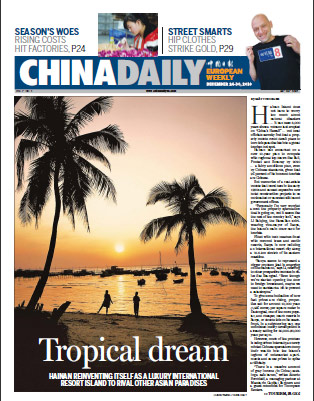G-7 may cast a wary eye on the yuan, yen
Updated: 2007-02-05 11:22
By JOELLEN PERRY (WSJ)
http://online.wsj.com/public/article/SB117045353215696637-tC_ShbMDKjhkOS6pBdybC_jLZ14_20070210.html?mod=regionallinks
When finance ministers from the Group of Seven leading industrial nations meet in Germany next weekend, look out for a tussle over two Asian currencies.
U.S. officials will continue to focus on China's weak yuan at the talks, which take place in the former industrial powerhouse of Essen. But European policy makers have said they will push for a discussion about Japan's currency to be included in the talks, as well. They say the yen's low value gives Japanese exporters an unfair edge against competitors that have to pay for their costs in euros. After losing 10% against the euro in the past year, the yen hit record lows in January against the European Union's common currency, which is used by 13 nations, including Germany and France.
Japan is expected to fight back, and this time will find the U.S. on its side. Though Japan has often been criticized in the past for manipulating the yen's value, Treasury Secretary Henry Paulson said last week that the yen's value now accurately reflects Japan's economic situation. Though the yen recently hit four-year lows against the dollar, and U.S. car makers have also complained about the currency's weakness, U.S. Treasury officials are reluctant to champion any artificial adjustment in the yen at a time when they are pushing for a market-valued yuan.
Japan's timid recovery is part of the reason its currency is low. Rock-bottom interest rates, at 0.25%, have also made the currency a prime player in the global "carry trade," in which investors borrow in low-yielding currencies like the yen to invest in more lucrative currencies elsewhere. Carry trades further weaken the yen as traders sell off the currency. With domestic consumption and consumer-price data still muted, significant interest-rate rises from the Bank of Japan seem unlikely in the short term, so the yen will likely stay low.
That is a particular problem for countries that use the euro. Exports helped last year to power the euro bloc to its fastest economic growth since 2000. Policy makers worry a feeble yen, on top of the euro's recent rise against the dollar, will undercut that expansion. Manufacturing survey data for January show a stronger euro has already begun dampening export growth across the region.
A flagging yen also underscores the euro zone's widening disparities. Productivity increases and meager wage growth have helped Germany gain against reform laggards like France and Italy to become the world's largest exporter in terms of value. "We are more sensitive to the exchange rate because we are less good than Germany in terms of structural competitiveness," says Christian de Boissieu, chairman of the French Prime Minster's Council of Economic Analysis.
More fundamentally, as the euro strengthens simultaneously against the dollar and the yen, European policy makers worry the currency is unfairly bearing the burden of global imbalances. When the dollar slid last year, in part on fears of the U.S.'s huge trade deficit, Asian economies with trade surpluses and currencies pegged to the dollar helped stem the slide by buying dollars. At the same time, jittery investors world-wide switched dollar-denominated assets for euro ones, pushing up the European currency's value.
Paper's Digest

Jingle bells
The younger generation and every king of retailer are embracing the christmas holiday more than ever before across China.
Chinese shoppers boost luxury market
Growing appetite for foreign firms
Happiness quotient
Specials

If you're happy and you know it
Chinese J.K. Rowling's best-selling children's works are rapidly finding a foreign audience

Clothes maketh this man
English entrepreneur pioneers hip streetwear culture and becomes one of the locals in old Beijing.

Ich bin ein Beijinger
German sinologist's lifelong connection with China is deeply rooted.
